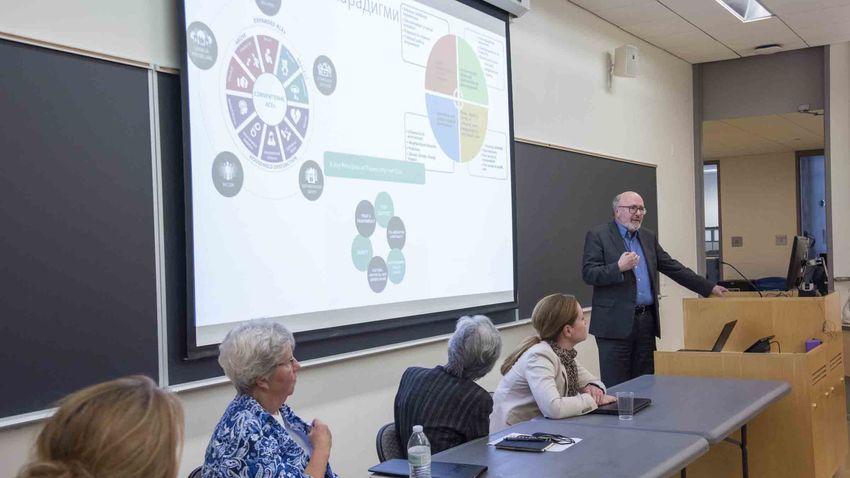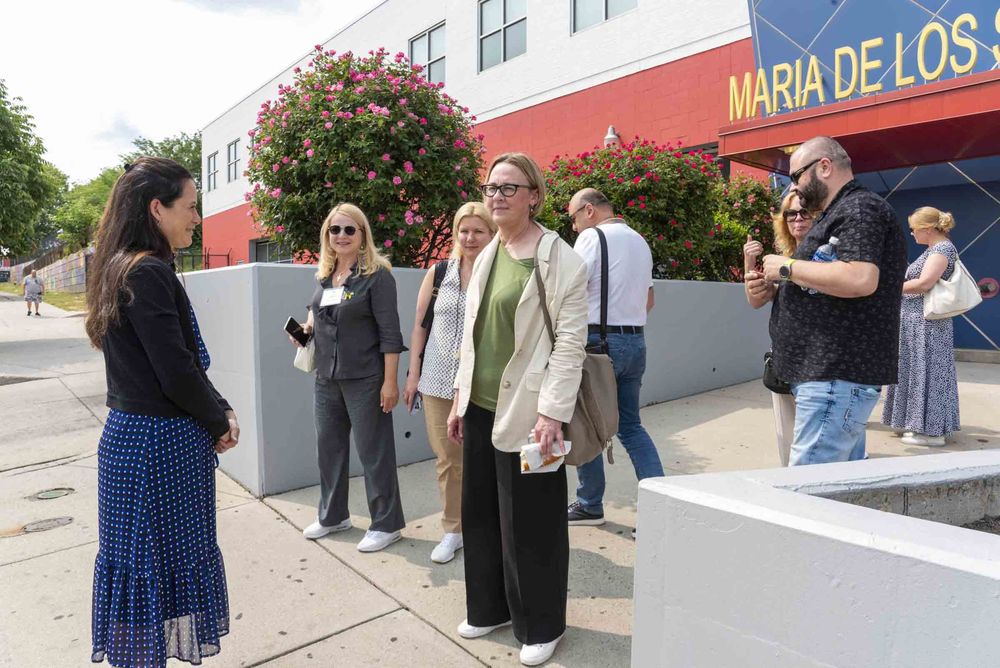
Fourteen senior health officials from Ukraine visited Philadelphia from June 11 to 17, gathering strategies for addressing a quietly emerging crisis amid Russia’s devastating attacks: their country’s rising need for mental healthcare. Over five days, leaders of Ukrainian national and regional agencies visited facilities across the city and heard presentations from public health officials, providers and experts.
“The current mental health system in Ukraine is not adequate to really address the challenges that will be occurring in the next years,” said William Aaronson, associate professor in health services administration and policy at the College of Public Health and one of the organizers of the Ukrainian study tour. “It's widely recognized that mental health issues are going to increase, with PTSD among the most likely to be diagnosed.”
The Philadelphia study tour is part of a larger initiative, a $45 million program funded by the U.S. Agency for International Development (USAID). USAID’s Ukraine Public Health System Recovery and Resilience Activity was conceived before Russia’s invasion, partly in response to COVID-19, aimed at strengthening the government of Ukraine’s ability to respond to public health threats. It has expanded to include mental health support for veterans and conflict-affected populations. Since the invasion began, destruction of healthcare infrastructure, including at least 162 facilities, has severely disrupted health and other critical services in Ukraine, according to USAID.
“It’s very inspirational that you are here,” said Philip McCallion, director of the School of Social Work, who anchored a panel of academic leaders explaining how mental health professionals in the United States are trained and work with clients. With his PowerPoint slides prepared in Ukrainian and a live interpreter translating, McCallion told the visitors that he grew up in Belfast in the 1960s and ‘70s and understands the impact of violence and war on mental health.
At one point during the panel, the sound of a siren filled the lecture room. Some members of the Ukrainian delegation had not turned off the air alert apps on their mobile phones that warn residents back home to get to shelters.
“The last six, seven weeks have been really, really hard,” said Alyona Gerasymova, Ukraine director for Pact, the humanitarian nonprofit that is leading this program to build healthcare capacity in Ukraine. “Every night and sometimes several times during the day. It’s not just the siren. They actually hit residential buildings. This is a huge collective trauma, living through the war. Everyone says Ukrainians are so resilient. Yes, Ukrainians are resilient, but the length of time, it’s in the second year. Everyone knows someone who was killed, someone who had to relocate. I can't really smile as much as I used to smile. I can’t find joy.”
The Philadelphia study tour was focused around the idea of making behavioral healthcare an integrated part of primary medical care. Pact worked with a local coalition led by Aaronson; Natalie Levkovich, CEO of the Health Federation of Philadelphia; and Jennifer Kolker, director of the Center for Public Health Practice at Drexel University’s Dornsife School of Public Health. CPH graduate students Claire Lasky and AnneMarie Tomosky managed logistics, securing everything from transportation to translations.
The visitors received a crash course on how healthcare is structured and delivered in the U.S., “how the levels of government work in concert, or independently of each other, how the public sector interacts with the private sector, how the local is influenced by state financing,” Levkovich explained. Cheryl Bettigole, commissioner of the Philadelphia Department of Health, and Jill Bowen, commissioner of Philadelphia's Department of Behavioral Health and Intellectual disAbility Services (DBHIDS), described public health systems at the local level. At the Veterans Affairs Medical Center, the visitors heard about the continuum of care offered to U.S. military veterans.

At other locations, the delegation learned how trauma-informed clinical services are delivered within communities. They visited the Children’s Crisis Treatment Center in Fishtown and toured exam rooms at the Maria de los Santos Health Center in North Philadelphia, the city’s largest facility delivering health services to Latino residents, operated by the nonprofit Delaware Valley Community Health. Providers at the Health Center described their multidisciplinary team approach to patient care that integrates medical, dental and behavioral health, connecting all the factors that influence a patient’s wellbeing, including environmental issues that can affect whole communities. “Poverty, gun violence, food insecurity, all of these things have an impact on physical and behavioral health,” Delaware Valley Health CEO Scott McNeal said.
The visitors to Philadelphia also took time to tour historic Old City, photograph the city’s murals, and sample soft pretzels. They brought gifts. To McNeal, they presented a framed collection of colorful Ukrainian postage stamps, including one from 2022 that has become rare and highly coveted, depicting a scene that became a symbol of the nation’s resistance. It illustrates a Ukrainian soldier on the shore of the Black Sea, responding to a Russian warship’s demand to surrender with a particularly colorful gesture.
With an eye toward helping Ukraine build its behavioral health workforce, McCallion and other academic leaders at the panel presentation delved into how U.S. professionals are trained and certified as social workers, psychiatrists, psychologists and nurses. One panelist displayed a map revealing shortages of behavioral health professionals across America. To the Ukrainians, shortages are a relative thing.
“The biggest takeaway from the group here is, wow, you have this fantastic access to services,” Gerasymova said. “You may see it as limited, but you have psychologists, you have nurses, you have social workers. You have access to services through schools, through other entry points, which is missing in Ukraine.”
“The Ukrainian public health officials seemed particularly interested in building partnerships for continuing education, sharing resources between countries, and developing peer-to-peer networks,” Lasky said afterward. “A large focus was the development of the mental health workforce—from types of positions to educational requirements and programs.”
Aaronson said next steps will focus on bolstering Ukraine’s behavioral health system capacity. “We're going to be working with MPH programs in Ukraine, to bring MPH education up to the point where it is effective in developing a public health workforce,” he said. There will be a focus on developing community mental health workers, with training programs for them, and training of trainers. “The group that came over are people who can lead the change,” he said. "We can't make changes in Ukraine, but we can catalyze change.”
